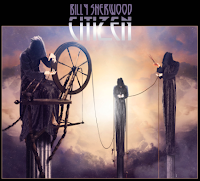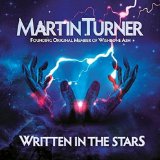Rob Zombie guitarist ready to hit the road with The Creatures, Doyle
By Peter Lindblad
 |
| John 5 |
John 5 has always had a thing for monsters.
His youthful infatuation with old horror movies continues unabated to this day, and the kid in him still worships at the clawed, platform-soled feet of KISS, whose Kabuki-inspired make-up and carnivalesque stage theatrics never fail to amaze and delight the ex-Marilyn Manson and Rob Zombie guitarist, known for creating his own creepy facial masks.
In a matter of days, John 5 and his band The Creatures – with Rodger Carter and Ian Ross – will kick off the "Mad Monster Tour" with a special show in Ramona, Calif., on Nov. 4. To get tickets, go to
www.john-5.com. Some of the dates will be supported by
Doyle, the band led by former Misfits member Doyle Wolfgang Von Frankenstein.
Remarkably versatile, with audacious fluency in a variety of genres – having recorded everything from bluegrass and country to Flamenco music and metal, rock and pop – John 5 is a demon on guitar, an incredibly smooth player whose speed is almost supernatural. Along with scoring the Rob Zombie film "The Lords of Salem," John 5 has collaborated with a wide range of artists, working alongside everyone from Ricky Martin to Rod Stewart, David Lee Roth and Lynyrd Skynyrd, in addition to his more well-known gigs with Manson and Zombie.
Since 2004, John 5's burgeoning solo career has yielded eight diverse studio albums spotlighting his virtuoso skill. On "The Mad Monster Tour," John 5 and company will be promoting an upcoming greatest hits album, paired with a live DVD of John in concert. Three brand-new singles will be released, a series that began this month. Recently, John 5 took time out to talk about the tour, how the new Rob Zombie material is coming along and a career that has taken him further than he ever thought possible. (Tour dates follow the Q&A).
How did the tour with
Doyle and his band come about and what are you looking forward to most about
it?
J5: Well, I
always thought Doyle was like a real-life superhero, and I just really think
he’s amazing. He looks like a real-life superhero, like he could fly over a
building and knock it down. You know, he’s got the guitar and he grabs it, and
he’s a great, great musician. So, I always wanted to do something with him; he was my first choice for someone I wanted to do a tour with. And I just said,
“Hey, are you available around this time?” And he said, “Yes,” so it came
together pretty easy and we start the fourth in Ramona, Calif., which is the
San Diego area. And then it’s the Whisky in L.A. So it’s going to be a blast
running through these shows, because it’s all my crazy instrumental stuff and
it’s crazy and it’s fun, and we’ll just go nuts.
 |
| Mad Monster Tour poster |
When were you
introduced to the Misfits and what were your initial impressions?
J5: Well, it was, like for everybody, just a natural thing. Everybody loves the
Misfits and punk rock. Everybody was just into them. It was just the thing. It
was just how it was. And I loved the horror-rock thing. I’m so into that as
well. So it’s just the perfect fit and yeah, with Alice Cooper and The Misfits
and Ozzy, I love that stuff. It’s fun. It’s a blast. And KISS, of course. KISS,
yeah. It was like monsters with guitars, and when I was 7 years old, I was just
blown away. This was just the greatest thing ever.
Reading your bio, you talked about where you grew up and being the lone rock kid, but did you
have friends who felt the same way?
J5: Oh sure. I
was always the one that had the stuff. Like, I had the first Van Halen when it
came out, KISS Love Gun … I was that
kid that had the stuff. So I think I showed it to a lot of people, but I
remember someone bringing over Kill ‘Em
All by Metallica. I listened to that, and I go, “Oh, wow!” I remember
having times in my life where friends brought over music, and I remember it. I
remember it so vividly, because it made such an impression on me.
Was there one that
made the biggest impression?
J5: Well,
obviously, KISS and Van Halen, because I remember I got the KISS album in the
early years when I was super young. I think Love
Gun had just come out. And I was shocked because I loved that Monsters of
Filmland magazine. And then I loved The Monkees and “Hee Haw,” but when I saw the
monsters of guitars in KISS, I was blown away. I was just like, “Oh my God.
Here we go.” So it just changed my life, and then I remember my guitar teacher
brought over Van Halen I, and it was
just another epiphany. It just changed my life completely.
Kirk Hammett I know
has a massive horror collection. Do you collect horror movie memorabilia?
J5: No, mostly I
just collect guitars … Telecasters. I’m really into that kind of thing, really
into loving my “Teles,” but there’s so much. I mean I have a lot of horror
stuff, but it’s mostly stuff people have given me. And I like that stuff from the
early- and mid-‘60s and ‘70s, when the monster boom really, really happened. So
I like a lot of that stuff. And you know fans give me stuff, so I have quite a
collection, but nothing, nothing, nothing in the world of Kirk Hammett, of
course.
Have you ever seen
his collection?
J5: I haven’t,
but me and Kirk talk, and he’ll tell me stuff, and I’m like, “Jesus,” you know?
And he always says, “You’ve got to stop over and check it,” and all that stuff.
Hopefully, one day I’ll get there.
I wanted to
talk about other stuff going on with you, and you have a greatest hits album
coming out. Did you ever think you’d have a greatest hits album and what goes
into making one? Is there more to it than people think?
J5: Well, yeah.
What it is really is just a collection of my favorite songs. Not one of them
was a hit, but it’s a collection of my favorite songs that I’ve recorded over
my catalog of doing instrumental stuff and the fans’ favorite songs. So
I put them all together, and then I put a DVD with it, which is so cool. The
DVD’s really great, and I’m going to be selling that at the shows, so people at
the shows will be able to get the CD and DVD. And then after the tour you’ll be
able to buy it on my website, and also it’ll be on iTunes, but you won’t be
able to get the DVD, obviously.
So much has happened
over the span of your life to bring you to this point, but I wanted to ask you,
where does the open-mindedness with music come from? Because you do country,
you do all kinds of things. Does that come from your family?
J5: You know, for
some reason, I’ve always appreciated someone who does something really, really
well. And it could be someone that rides a bike and is a bike expert, or
juggles or … I just always appreciate someone who does something so well,
because I know how much dedication and practice it takes. So when I hear some
Western swing music or bluegrass music or great, great, great, great horns, I’m
like, “Wow! That’s amazing.” So I appreciate all of that stuff. I’m so inspired
by anyone who does something really, really well and who is an expert and at
the pinnacle of what they do. And I totally, totally appreciate that. So that’s
where I think a lot of that interest comes from, that they can actually … you
know, the greats. I just am really influenced by people like that.
Is there a style of
music you haven’t worked with yet that maybe you’d like to?
J5: You know,
jazz is such a huge thing, but I’ve never really studied, studied, studied
jazz. I don’t know why. It just hasn’t bitten me yet, but it will. I will get
into it. I think I really love the really super, super fast, aggressive stuff.
Like the bluegrass stuff is so fast, you know. It’s like Slayer with no
distortion. It’s crazy with bluegrass. And then the same thing with flamenco
music, it’s a Spanish style of music. It’s so fast, you know? It’s like Slayer
on acoustic. It’s that kind of thing, and I really enjoy that stuff, but also
I’d like to get into jazz at some point, I believe.
Could you do a
bluegrass version of “Welcome to the Violence”?
J5: Well, that
might be tough (laughs). Yeah, that’s possible.
What impresses you
most in a guitarist or a live performer?
J5: Someone that
is fluid and clean and no effort. It’s just like drinking a bottle of water.
It’s effortless, and there’s a small amount that are really effortless. If you
ever see a classical violinist or piano player, it’s just effortless, you know? I appreciate that, but I also appreciate any guitar player also getting up
there on the stage and doing a great job, because it’s a lot of work and a lot
of stress and a lot goes into it.
What goes into your
live performances? You’ve got the makeup and everything going on. What’s the
day of a performance like for you?
J5: Well, the whole day is about the performance. The whole
thing is prepping. It’s getting your fingers warmed up, it’s doing
meet-and-greets and meeting people, and making sure everything is right. Sound
checks … the day all leads up to the show. It’s very important. I just want to
give fans the best show we can, so it’s just playing, warming up, making sure
the playing is right, getting ready and giving the best show we can. It’s very important
to us with Rob just getting just a great show together, and then we always talk
about the show after the show – make sure this is right, that is right, how we
could make it better. So, it’s great. It’s a great life. I cannot
complain.
I was reading about
your history and you were robbed in L.A. when you first moved there. Did you
ever come close to giving it up?
J5: No, no …
never did. I was so determined and I was so driven and determined. Just
imagine, you get to L.A. when you’re young. I was so young. I didn’t know
anything, and then the first night I got all my money stolen. I didn’t know
what to do. I was lucky I knew one other person, and anybody else; most people would have just gone home and said, “Let me try this in another couple of
years.” But no, I was so driven.
By the same
token, was there a moment when you felt, “I’ve finally made it”? Or were there
many moments like that?
J5: I mean, yeah.
You know, I’m just happy to be playing guitar and making a living, but I never
wished to be a known guitar player. I just wanted to be a session musician, and
this is all just an incredible, incredible gift, because it was too far away. I
never really thought I’d be able to do this, because it was just so like
wishing you were Superman or something. It just seemed so unbelievable. So I
really appreciate it and love it, because it just happened. I’m so happy it
happened, because it was never my goal, it was never my thing to become a
famous rock guitar player.
What influenced you most as far as stage shows
and how you make up your face? Was it a love of KISS or was it more than that?
J5: I use myself as the audience and what
the audience would like to see. I think the audience wants to see a show, they
want to see a … it’s called entertainment. So they want to be entertained, and
it’s just if you put on a show like that – meaning you’re not going to walk
around the streets like that, but if you’re onstage, you’ve got to give them
something to look at. And when we go into our dressing rooms, we’re in our
normal clothes, there’s a couple of camera flashes and stuff like that, but
when we come out of our dressing rooms, when we’re all made up, you can hardly
see where you’re walking because there are so many flashes, because we’re all
made up. Would you want a picture with Ace Frehley with his make-up off or in
his whole get-up? You’d want it in his whole get-up. So that’s why. It’s just a
couple things I think about to say, “Okay. This is what make sense,” because
some people take a different course about it.
Why does it work so
well between you and Rob?
J5: I don’t know.
It’s hard to explain. I really look up to him a lot, because he does so much.
Now a lot of people can do a lot of things, but to finish them and to make them
really great, that’s the hard thing. And that’s what he does. Whatever he
starts, he finishes, and I really like that. He’ll start something and then
he’ll finish it. And that’s what I really like. He’s always finished it, and I
really respect that. We really enjoy the same things. We love the Universal Monsters. We have such a love for those Universal Monsters, those monster
movies, so that’s a great thing. We both have the same hobbies. We love music
and movies, so it’s just like being in a band with your best friend. It’s
amazing.
In what ways were
your experiences with Marilyn Manson and Rob similar?
J5: Well, they’re
both two different animals, of course. With Manson, it’s different every day
and every night, so you never really know what’s going to happen. With Rob,
everything is scheduled – we’re going to meet here, we’re going to do this and
we’re going to do that, and we’re going to be on the bus and here we go. So,
with Manson, you don’t know if we’re going to be backstage until three in the
morning and if we’ll make it in time for the next show. It was that kind of
thing. You know, both are amazing artists, both are amazing performers, so
that’s how they’re similar.
Did that chaos with
Marilyn translate to the live show and make that a different experience?
J5: Absolutely.
Sometimes, we’d play only three songs and we’d be done. Sometimes you wondered
how long you were going to play.
What was your greatest
moment with Marilyn and then with Rob?
J5: Well, that’s really, really tough. You know, the
greatest moment between those two, there’s some many, great, great, great moments
that have happened with both bands. Getting a No. 1 record with Manson, that was
a great moment. Doing the "MTV Video Music Awards," that was a great moment. That
was my very first gig with Manson. Getting awards and getting to play all these
great places, and then having your friends at these great moments, and getting
to travel the world and playing the greatest venues, having great records that
come out and having these great friendships that will last forever. There are
so many great moments, you can’t just limit it to one, because there are so
many and I’m lucky for that.
Of all the projects
you’ve done, was there ever one you went into thinking, “I don’t know about
this,” and then it turned out to be a better experience than you thought?
J5: Well, no,
because I tend to be pretty careful about what I take on. You know, I’m very, very
careful about the reputation of my name, so it’s not like I’ve ever gotten into
a situation where I'm like, ”How am I going to get out this?” No, I’ve never done
that.
I know so many people
have helped you along the way. Rudy Sarzo played a big role in helping your
career. What do you remember most about meeting him that first night?
J5: Well, meeting
Rudy helped me tremendously. He introduced me to Irving Azoff, who is a master
in the music business, and a manager of record people and taught me this, that
and the other thing about the business ... He let me into his
home. He helped me out, and he’s a wonderful, wonderful talent, and taught me a
lot of things. So I owe a lot to Rudy Sarzo.
And you’ve stuck with
people and worked with them over your entire career, like your producer Bob
Marlette.
J5 : Yes. You
know, it’s funny. Everybody I’ve worked with I’m pretty much still in contact
with. Everyone … because they’re good people, and I never leave anything on a
bad note, where it’s like, “Screw you!” So it’s good, because you see everybody
because it’s such a small, small world, and you don’t think you being in this
world of, “Oh, I’ve seen this person. I’ve seen this person. I’ve seen this
person.” It’s wonderful, and I’m so happy that I don’t have any bad blood.
You’ve worked with
some amazing guitar players, too, including Lita Ford. That must have been a
blast for you.
J5: Yeah, it was a blast. I see her every once in a while and
she’s such a great, great, great talent. And she’s a great songwriter, great
performer and singer … luckily, I had the privilege to play with her and play
some songs with her. I really respect her. She’s great.
Probably underrated
as an artist …
J5: Oh sure, she’s
great. And she’s been doing this forever. I mean, The Runaways? Come on … just
awesome. She’s so great. And then all of her solo stuff – what a career.
How did you get this
band The Creatures together?
J5: Well, I was
recording my instrumental stuff. I had recorded so many records, but I never played
live shows. The drummer that I use said, “You should do some live shows.” And I
said, “Well, it’s tough. The Zombie schedule is so busy,” but I said, “I’d love
to do it. We’re going to have to get somebody. Let’s do it. Let’s do some
shows.” I was really nervous because I’ve never done these kinds of shows. I
didn’t know if people would show up, I didn’t know if people were going to
care, I didn’t know anything about it. But we went out there, and it was such a
huge success, and I was so happy. It just really changed my life, and we just
said, “All right. Let’s do this.” And it’s so much fun. I’m so happy that the
drummer, Rodger Carter, kind of pushed me to do this. And it was wonderful. It
really changed my life.
Does it continue to
evolve, this project you’ve got?
J5: Yeah,
absolutely. We’re doing another tour starting in November … we’re just going to
keep doing it, keep doing it, and whenever I have time away from Zombie, I’ll
be able to do this.
What did you enjoy
most about working on the last record working with Rob? Was it different from
any other records you worked on with Rob? Or did you like the songs better and
do you think he’s underrated as a songwriter?
J5: Well, the record we have coming out with Zombie
now, that will come out next year, it is so good. We went up to his place, and
it is very secluded, and there’s nothing out there. There are no distractions –
really, really a great place to make great music, and you really have the time
to live with it. And that’s what I think is very important, because you have
the time to say, “Oh, let’s change this or make this better, or I can play it
like this.” And I think that’s important, because a lot of bands they do these
records and they have to deliver them at a certain time. We took our time and
this record that’s going to be coming out … I mean, the songs are amazing. It’s
great, it’s heavy and it’s just … you know, I was a Zombie fan before being in
the band and this one’s going to be great that’s coming out.
Do you remember
hearing White Zombie for the first time? What did you think of them?
J5: Well, yeah,
it was seeing the video of “Thunder Kiss ’65” … yeah, that was rad. It was the
look, it was the sound and it was just cool. It was just something that you saw
that made you say, “That’s got something special to it.” So, yeah, it was just
a great, great, great thing.
"The Mad Monster Tour" dates:
Nov. 4 – Ramona, CA @ Ramona Mainstage
Nov. 5 – Los Angeles, CA @ Whiskey A Go Go**
Nov. 6 – Las Vegas, NV @ Count's Vamp'd**
Nov. 7 – Phoenix, AZ @ Marquee Theater**
Nov. 8 – Ventura, CA @ Discovery**
Nov. 10 – San Francisco, CA @ DNA Lounge**
Nov. 12 – Orangevale, CA @ Boardwalk**
Nov. 13 – Fresno, CA @ TBD
Nov. 18 – San Antonio, TX @ Sam's Burger Joint
Nov. 19 – Dallas, TX @ Trees
Nov. 20 – Tyler, TX @ Click's
Nov. 21 – Houston, TX @ Scout Bar
** Dates with Doyle

























